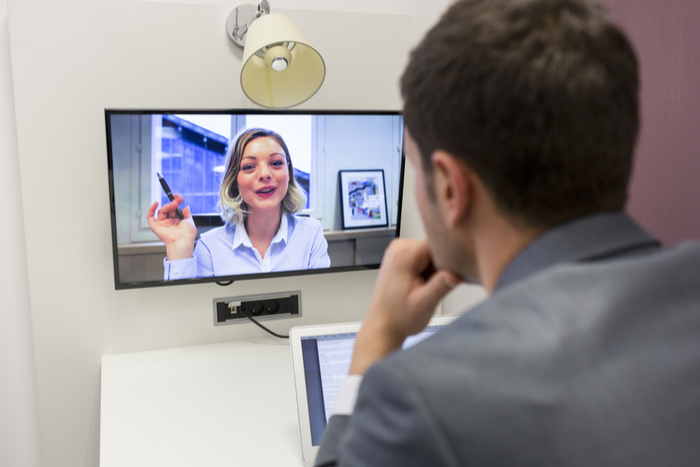How to prepare for a FaceTime job interview.

As we move into the future, both interviews and jobs are becoming more remote. And thank goodness; although face to face interaction will remain better than technology for some time to come, stay-at-home positions allow everyone to save time and energy.
However, the changing times require a change in tactics, and unwary job seekers will be at a disadvantage.
Take care, don’t be caught unaware! FaceTime interviews require everything a normal interview would, and then some. To help you score that first career, take these rules to heart.
How to prepare for a FaceTime job interview
Your knowledge
Always, always, always know about the interview. Research the company. List the job expectations. Prepare questions, understand your own qualifications, and do the research. You might be surprised how many interviewees forget this part!
If you’re unsure how to start, the company’s website usually contains everything you need to know. However, when given the name of your interviewer, consider looking them up on Indeed.com, if only to make sure you can match a face with the name.
So, why is this so important? Many of the concepts we’re about to discuss are variable: you should always wear “appropriate” clothes, but that description could mean a full suit, costume, or casual wear depending on the situation. To make the right decision, you need more information. Build a good foundation to stand on!
Your setup
Don’t wait until the call! You should have a location prepared for the most casual job interview. Go through the list:
1. Think about comfort
Generally, interviewees present themselves best while at ease, so have a good place to sit, a table, and an “appropriate” chair. Formal interviewers may not appreciate you reclining in a beanbag couch, others might find it acceptable or even humorous. Again: knowledge comes in handy.
Next, find a place to set your device. Even if you can hold a phone the entire time, you’ll give a much better interview without the constant distraction of maintaining steady hands. Besides, that little corner video showing yourself already distracts us enough.

2. Consider privacy
What noises can you hear outside the room? Are there other people with you? How can you find some privacy? This principle goes two ways: you don’t want others interrupting your conversation, and housemates often don’t like being watched. And we assure you, anyone in the background of a video will be watched:
(Side note: you may be wondering why he doesn’t get up from his chair. He probably decided to wear informal pants or none at all. Keep that in mind…)
Your room itself
The design, layout, and decorations inside a room admittedly convey your personality. Still, it’s far better to show your personality with interaction rather than a poster! We suggest keeping the room minimalist and professional in most situations: remove anything that would distract from you, the main attraction.
However, you may wish to lay out a few subtle items to convey a theme. Writers may wish to place books within view, or engineers may choose to sit in front of their past design projects. Just make sure your surroundings don’t become more interesting than you, unless you plan to make them a topic of conversation.
Your look
We’re going to address a common misconception now: wear pants. Hopefully, you saw the potential consequences in the BBC video above.
Moving on.
Once again, information will help you determine what to do; factor in the job expectations, the specific company, and your interviewer. Once that’s finished, begin selecting an outfit.
At the very least, gents should consider wearing a tie and a button-up, collared shirt. Add a coat if the job feels especially professional, and don’t worry about being “overdressed.” Many would argue there’s no such thing.
Besides, doesn’t it feel great to dress well? We sure think so!


The interview
Take a moment to really look at an interview from the interviewer’s point of view. What would you want?
Surprisingly, one of the answers is, “Not a robot.” Another answer may be, “Good conversation.” While qualifications certainly matter, almost everyone wants to enjoy themselves and interviewers are no exception. For this very reason, comm majors have been increasing in value: skills lose their flavor when they aren’t paired with the ability to communicate.
If you need help, check out these tips:
1. Remember how we mentioned questions? Bring them in now! Ask your questions and let the interviewer talk for a while. This may give you time to calm down, help you think of more questions, or simply provide answers you were missing before.
2. Remember how we mentioned knowing yourself? Don’t ever forget that you are interesting. If you programmed a flash game, self-published a novel, ran a marathon, or even planned a birthday party, you have something to talk about. Those experiences show fortitude, self-determination, and problem-solving ability.
Good luck
With knowledge ready, a good place to sit, the right clothes, and an understanding of the interviewer’s perspective, you have a much better chance of landing the job1
Still, things happen. If/when they do, remember: many interviewers appreciate the ability to take mishaps in stride. Stick with it, prepare rather than worrying, and you’ll eventually land a job!

Comments
Post a Comment